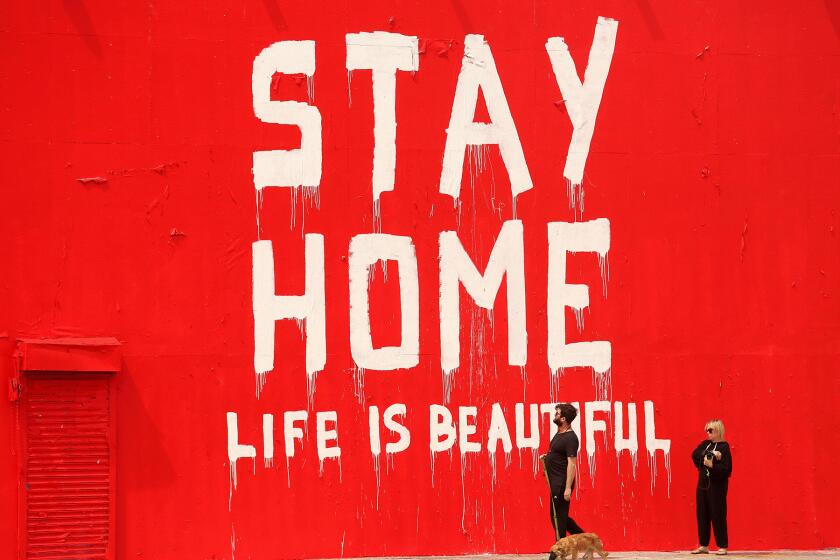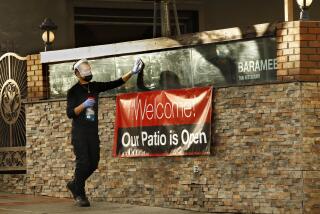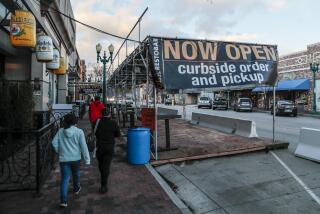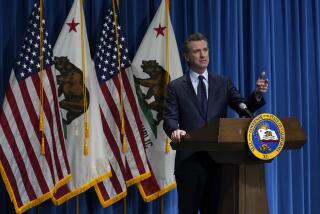With nearly 20,000 dead and economy hit by lockdown, California faces treacherous phase of pandemic
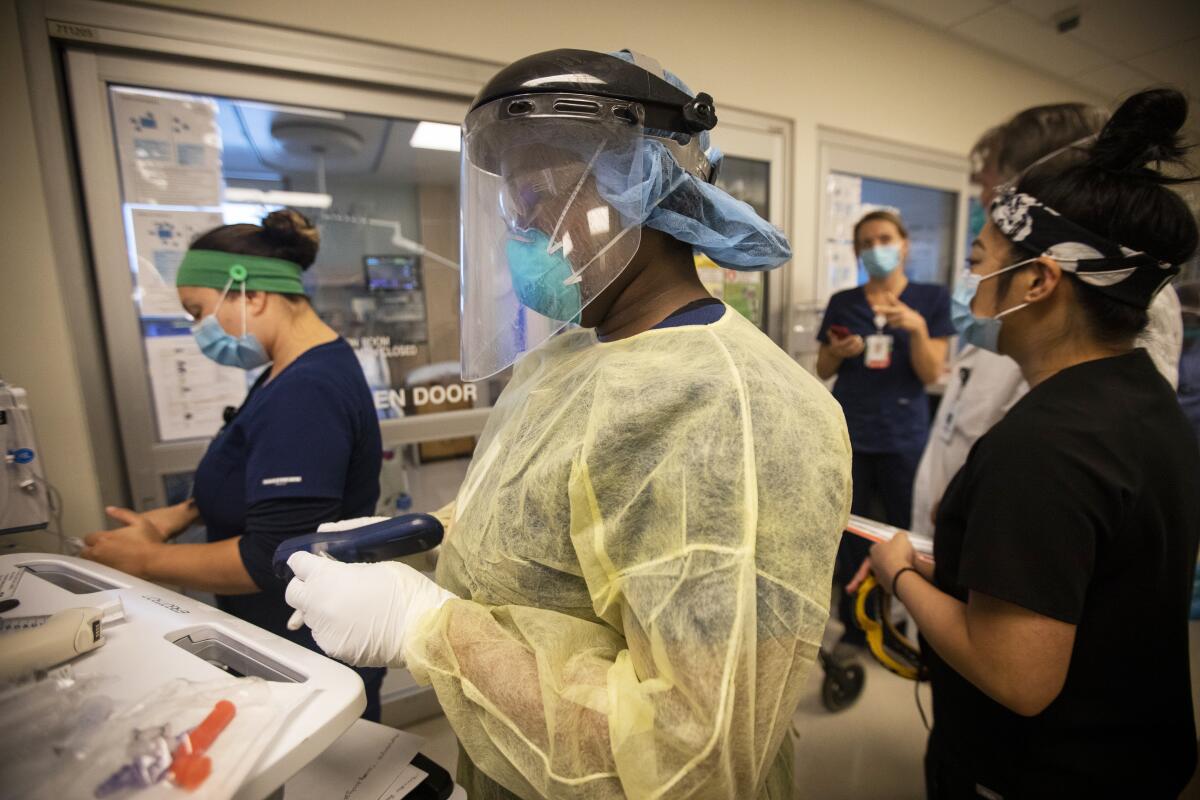
The pandemic that has killed nearly 20,000 Californians and brought a once-booming economy to its knees entered a treacherous phase Sunday as much of the state began a new stay-at-home order and coronavirus cases soared to unprecedented highs that show no signs of slowing down.
The Department of Public Health in Los Angeles County, a hot spot of the coronavirus in California, reported more than 10,500 new cases on Sunday, a staggering number for a single day that underscores fears that the virus spread rapidly during the Thanksgiving holiday weekend. Hospitalizations for COVID-19 neared 3,000 — and L.A. County Public Health Director Barbara Ferrer said that number could rise dramatically in the next few weeks as the full toll of the holiday comes into view.
This was the seventh consecutive day of record-breaking COVID-19 hospitalizations in L.A. County, and more than quadruple the number from early October, when there were about 700 hospitalized people with the disease.
“I wouldn’t be surprised if we start seeing daily hospitalizations approaching 4,000 in a couple of weeks,” Ferrer said in an interview Sunday. “I am positive that we haven’t seen the full increases in our case numbers associated with the Thanksgiving holiday, just based on the timeline.”
Gov. Gavin Newsom has announced a stay-at-home order affecting most of California.
She said it will take some time for the effects of the stay-at-home order to become clear, and in the meantime, the numbers will keep going up. The average number of L.A. County residents dying daily of COVID-19 is now about 39, nearly quadruple the number from early November, and is expected to worsen.
“We’re going to see three weeks of devastation before we’ll be able to assess the impact,” she said.
But the grim forecast was little solace to thousands of restaurants, hair salons and other businesses that will have to either close or dramatically curtail operations due to the order. Retailers have already been devastated by earlier lockdowns. And many say they are not sure they can survive another one.
The stay-at-home rules, which are less stringent than those imposed in the spring, have faced strong opposition from restaurant owners and others who say they are being unfairly targeted. L.A. County suspended outdoor dining last month, but the new order extends the suspension to counties that are home to tens of millions of people.
“It’s devastating,” said Hilary Goldner, co-owner of Sweet 1017 Hairdressing in Seal Beach. “We had had the two closures already, and this one comes at the busiest time of the year. Everyone is trying to move forward with their lives, and we play a role in that. It’s unfortunate and disappointing.”
Photos look back at 2020’s wild ride in the Golden State.
The regional stay-at-home order is the latest attempt to tamp down on an unprecedented surge in coronavirus cases and related hospitalizations that officials fear could overwhelm the local healthcare system.
Statewide, average daily coronavirus cases have jumped sixfold since early October, hospitalizations have quadrupled since late October, and average daily deaths have nearly tripled in just the last month.
Gov. Gavin Newsom announced the stay-at-home order last week, saying officials had carved up the state into five regions for the purposes of measuring hospital intensive care unit capacity. A region is required to implement the order after its ICU capacity drops below 15%, a line that Southern California and the San Joaquin Valley had already crossed when the mandate officially took effect Saturday.
The percentages fell further Sunday, from 12.5% to 10.3% for Southern California and from 8.6% to 6.6% for the San Joaquin Valley.
The regions were scheduled to implement the new order at 11:59 p.m. Sunday, and it will remain in place for at least three weeks.
In addition, five counties in the Bay Area decided to implement the order before reaching the threshold, as early as Sunday night.
Under the new rules, restaurants must halt in-person dining and can offer food only for delivery and takeout. Gatherings of people from different households will be prohibited, except for outdoor religious services and political demonstrations. Affected communities will be required to close hair and nail salons, playgrounds, zoos, museums, outdoor card rooms, aquariums, breweries and wineries. Nonessential travel and use of hotels for leisure will be prohibited, as will overnight, short-term stays at campgrounds. All retail can remain open, but at 20% capacity.
Across Southern California, Sunday became a last chance to get a haircut indoors or enjoy a meal at a restaurant with patio service before the rules took effect.
Rick Hayes, a retired high school English teacher, was enjoying his daily ritual of drinking coffee and reading a newspaper outside at the Hangout Restaurant & Beach Bar near Main Street in Seal Beach on Sunday morning.
Asked about the looming lockdown that will put his routine on hold for at least three weeks, Hayes said, “I think it’s unfortunate but probably necessary.”
The 76-year-old, whose mask was pulled down under his chin so he could sip from his mug, appeared to be in the minority of those wearing a face covering on the popular beachside strip of restaurants in Orange County.
“We got to get this thing under control,” he said. “Covering up seems to help.”
Hayes said he will continue ordering takeout as often as he can during the coming lockdown to try to help local businesses survive.
There was noticeably less support for the restrictions up the street at Hennessey’s Grill.
“I would really like to see statistics on mental health-related deaths as a result of this,” said Bob Berk, a retired aerospace engineer, who was having mimosas with his wife and another couple at an outdoor table. “Yes, this is a vicious virus, but you have people who are not just losing their livelihoods but their lives to suicide and stress.
“It’s tragic,” Berk added, “but let the people who are at risk stay home. Don’t quarantine the healthy.”
“I believe, because of social media, we’re hyper-focusing on this virus,” Leslie Berk added. “Sure it’s bad, but to shut the country down is not OK.”
Scientists from around the world say the science is clear: closing public venues where people from different households interact with each other slows the spread of the coronavirus, reducing daily infections, deaths and hospitalizations.
Health experts have largely agreed the stay-at-home order is California’s best chance at slowing the infection rate before the healthcare system breaks down. They note that such orders have been effective both in California earlier this year and in Europe more recently.
“The stay-at-home orders worked the first time around in that we did, in a sense, flatten the curve and see decreases occurring,” said Dr. Robert Kim-Farley, medical epidemiologist and infectious diseases expert at the UCLA Fielding School of Public Health.
“So I think we in public health are hopeful that these new regional stay-at-home orders will be able to also reverse this upward trend.”
But there has definitely been a political backlash.
Riverside County Sheriff Chad Bianco called the new order “flat-out ridiculous” and criticized the state for threatening to cut funding to counties that didn’t comply with the state’s COVID-19 guidelines for reopening. Riverside County in October modified a plan to set its own reopening agenda after learning the move could jeopardize tens of millions of dollars in state funding.
Bianco singled out Newsom, calling him hypocritical for his handling of the pandemic and alluding to the governor’s much-criticized outing to the French Laundry, a pricey Napa Valley restaurant.
“It appears part of the new goal is to shift attention away from his and others’ personal behavior with a do-as-I-say-not-as-I-do attitude by turning public opinion against California sheriffs,” Bianco said. “He is expecting us to arrest anyone violating these orders, cite them and take their money, close their businesses, make them stay in their homes and take away their civil liberties, or he will punish all of us.”
Riverside County hit its seventh consecutive daily record for COVID-19 hospitalizations with 687 patients, according to data released Saturday; that’s more than five times worse than early October, when about 135 were hospitalized.
Times staff writer Thomas Curwen contributed to this report.
More to Read
Sign up for Essential California
The most important California stories and recommendations in your inbox every morning.
You may occasionally receive promotional content from the Los Angeles Times.

